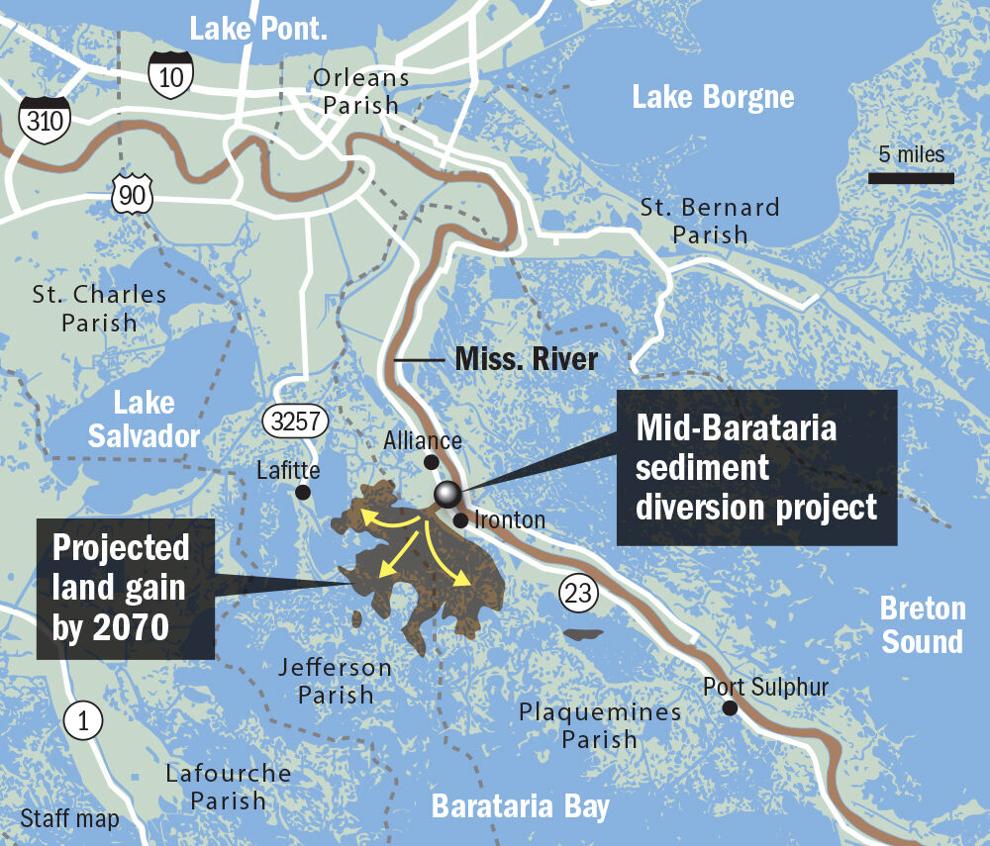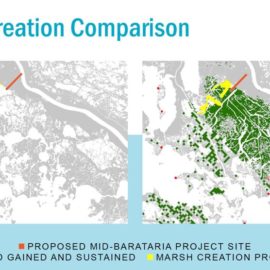
Louisiana Lt. Gov. Billy Nungesser and the St. Bernard Parish Council have come out against the proposed $2 billion Mid-Barataria Sediment Diversion, calling it a threat to commercial and recreational fishing, bottlenose dolphins and the economies and cultures of St. Bernard and Plaquemines parishes. Councilwoman Kerri Callais said the estimated 21 square miles of new land created by the diversion over 50 years is not enough to offset the potential loss of revenue from fisheries or the effects on the area’s heritage. “We all know the consequences this diversion will have on both of our parishes, the economic consequences, the consequences to our culture, to our tourism that’s so important to St. Bernard,” Callais said. “It’s part of our identity. It’s who we are.”
nola.com
This follows a similar vote from Plaquemines Parish. Chip Kline, chairman of the state Coastal Protection and Restoration Authority, did not know that this issue woukld be voted on and had earlier asked that the vote be deferred until the public comments were collated.
The diversion would send some Mississippi River water and sediment through a weir and channel at Myrtle Grove into Barataria Bay, rebuilding marsh there. But George Ricks, president of the Save Louisiana Coalition, said the damage caused to the fishing industry by the opening of the Bonnet Carré Spillway in 2019 was an example of the damage that could be expected from the diversion. Citing a discussion he had with a U.S. Navy dolphin trainer, Nungesser dismissed the Mid-Barataria draft environmental impact statement’s estimate that the diversion would kill 34% of the Barataria basin’s bottlenose dolphins. The dolphin trainer predicted close to 75%, he said. And he questioned why state officials agreed to let Congress exempt the diversion from compliance with the Marine Mammal Protection Act, which forbids projects such as this from harming or killing dolphins. The exemption requires five years of dolphin monitoring after the diversion is completed; Nungesser called that inadequate. He also questioned how the diversion could be paid for with money from the BP Deepwater Horizon natural resources restoration settlement. He said that disaster’s money was supposed to address its damage to dolphins and fisheries.
The damage to the dolphins would be caused by the low salinity caused by the fresh water of the Mississippi River pushing out the salt water that is now there.
Nungesser also charged that the Coastal Protection and Restoration Authority was improperly spending money on a publicity campaign in support of the diversion, pointing to several full-page newspaper advertisements and opinion columns. The ads actually were listed as sponsored by Greater New Orleans Inc. and nonprofit environmental organizations. He said his opposition began when he was president of Plaquemines Parish, a position he held from 2006 through 2014. He said he instead recommended building wetlands and ridge projects that used sediment pumped by pipeline from the Mississippi River into open water as ways to buffer sea level rise and rebuild coastal habitat.

In a Wednesday interview, Kline disagreed with almost everything Nungesser said at the meeting, including the allegations that coastal authority had coordinated recent publicity about the diversion. “The information that was relayed to the St. Bernard Parish Council by Lt. Gov. Nungesser was blatantly false and is a grave disservice to the public,” Kline said. He said the ads and opinion pieces were not requested or arranged by state officials. A video that Nungesser played for council members and said was produced by the state was actually produced by the Restore the Mississippi River Delta Coalition, an organization of national and state environmental groups, Kline said. Kline also said it was the state that requested the congressional change in the marine mammal law, that its request was publicized before the change occurred and that the state is still required to mitigate for any effects on the dolphins.
The thought behind the diversion was to replicate what the Mississippi would do and that the lane being built was needed.



